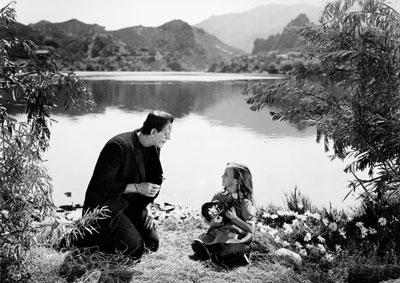Directed by James Whale
Carl Laemmle Jr., appointed head of production at Universal by his father in 1928, had ambitious plans to upgrade feature output and compete for the prestige market. By 1931, consigned to smaller budgets, but having scored a surprise hit with the sensationally popular (and economically-produced) Dracula, “Junior” began preparing Frankenstein as a follow-up.
Screenwriters Garrett Fort and Francis Edward Faragoh adapted Peggy Webling’s British stage version of Mary Shelley’s story but managed to crystallize the novel’s essential themes and emotions. From their economical narrative, director James Whale, new to horror, summoned an exquisitely pitched story to quicken the blood. From its chilling opening images of grave-robbing to its hyper-electrified creation scene (still a jarring spectacle of design and theatrics) to the climactic confrontation between the monster and his maker, Frankenstein peddled passion: that of a scientific genius longing to play god, and of his unfortunate, synthetic creation, reaching out for beauty, tenderness and ultimately, revenge. As portrayed by fiery Colin Clive and icy Karloff, these passions prove so much more interesting than the moral hand-wringing of Frankenstein’s fiancée (Mae Clarke), best friend (John Boles) and teacher (Edward Van Sloan), it is hard not to sympathize with both genius and monster. Nay-sayers at Universal worried that audiences might recoil from the macabre story of a man created from cadavers; the film actually opens with a spoken prologue by character actor Van Sloan, inviting audiences to think twice before subjecting their nerves to “such a strain.” Audiences, however, responded with the same enthusiasm that met Dracula the season before, vindicating “Junior” Laemmle, creating a permanent icon in the misshapen monster and a star of Boris Karloff, as well as solidifying Universal’s predominance in, and commitment to, the horror genre.
—Shannon Kelley
Universal Pictures. Producer: Carl Laemmle Jr. Based on the novel by Mary Wollstonecraft Shelley. Screenwriter: Garrett Fort, Francis Edwards Faragoh. Cinematographer: Arthur Edeson. Editor: Clarence Kolster. Cast: Colin Clive, Mae Clarke, John Boles, Boris Karloff, Edward Van Sloan.
35mm, b/w, 70 min.






 Mobile Navigation
Mobile Navigation

